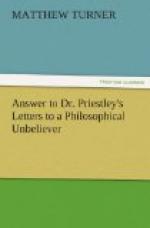Nor do I admit it to be an argument either for Revelation
or Natural Religion, that the same turn for speculation
that would convert a christian into a theist, will
carry him on to be an atheist, though I know the argument
has been often used. If upon sick beds or in
dying moments men revert to their old weakness and
superstitions, their falling off may afford triumph
to religionists; for my part I care not so much for
the opinions of sick and dying men, as of those who
at the time are strong and healthy. But in the
opinion of the one or the other I put no great stress.
My faith is in reasoning, for though ridicule is not
a complete test of truth, reasoning I hold certainly
to be so. I own belief may be imprest on the
mind otherwise than by the force of reason. The
mind may be diseased. All I shall say is that
though I have formerly believed many things without
reason, and even many against it, as is very common,
I hope I shall never more. My mind (I was going
to say, thank God) is sane at present, and I intend
to keep it so. I am aware that at the expression
just used some will exclaim in triumph, that the poor
wretch could not help thinking of his God at the same
time he was denying him. The observation would
hold good, if it were not that we often speak and
write unpremeditately and though what is in this manner
unpremeditately expressed upon a revision should be
certainly expunged, yet I chuse to leave the expression
to shew the force of habit.
In fear lies the origin of all fancied deities, whether
sole or numberless.
Primus
in orbe Deos fecit Timor.
But the great debasement of the human mind is evidenced
in the instance of attributing a merit to belief,
which has come at last to be stiled a virtue, and
is dignified by the name of faith, that most pitiful
of all human qualities. When the apostle spoke
of faith, hope and charity, he might as well have
exclaimed the least of the three is faith, as the
greatest is charity.
One enthusiast cries out un Roi and another
un Dieu. The reality of the king I admit,
because I feel his power. Against my feeling and
my experience I cannot argue, for upon these sensations
is built all argument. But not all the wondrous
works of the creation, as I hear the visible operations
of nature called, convince me in the least of the
existence of a Deity. By nature I mean to express
the whole of what I see and feel, that whole, I call
self-existent from all eternity; I admit a principle
of intelligence and design, but I deny that principle
to be extraneous from itself. My creed in fine
is the same with that of the Roman poet;
"Deus
est ubicunque movemur."




